

At the point when was it assembled : in the vicinity of 1632 and 1653 AD
Who fabricated it : Shah Jahan, fifth Emperor of the Mughal Dynasty
Time taken : 21 years
Where is it found : Agra, Uttar Pradesh, India
Why was it constructed : As a commemoration to Shah Jahan's darling spouse Mumtaz Mahal after her demise in 1631
Measurements : arranged in a 170000 sq. m complex; 57 m at the base; 68 m in tallness and raised stage stature 6 m
Materials utilized : White Marble for the primary catacomb, Red Sandstone for invigorating structure and accents
Planner : Ustad Ahmed Lahori
Structural Style : Mughal
Cost of Construction : 32 crore rupees
Kept up By : Archeological Survey of India (ASI)
Unique Recognitions : Declared UNESCO World Heritage site in 1983 and champ of the New7Wonders of The World List Initiative in the vicinity of 2000 and 2007.
Visit Timing : Sunrise to Sunset; Closed on Fridays; Night visits are allowed between 8:30 pm to 12:30 am for a restricted span of 30 mins.
Section Fee : By day, remote natives are charged Rs. 100, natives from nations are charged Rs. 530, Indian nationals Rs. 40 and passage for kids upto 15 yrs of age is free.
During the evening, section charge for remote, SAARC and BIMSTEC nationals stay same. Rs. 500 is charged for Indian residents and kids beneath the age of 3yrs have free section.
The most effective method to Reach:
Agra can be come to via air and land. The city has an air terminal, Kheria Air Force Station, which is provided food by day by day flights from all finished India through numerous carriers. Via arrive one can profit transport, prepare and private autos from the closest metro urban areas like Delhi (176.7 km), Jaipur (219.7 km), and Lucknow (289.5 km). Inside the Agra city one can profit auto, cycle rickshaw and navigates to achieve the landmark.
Renowned as one of the miracles of the world, the Taj Mahal at Agra, India, is exemplification of genuine romance and enthusiasm. The Taj Mahal was worked by the acclaimed Mughal ruler Shah Jahan in memory of his darling spouse, Mumtaj Mahal. The building excellence and wonderfulness of the Taj Mahal has never been outperformed. It is said to be the most lovely landmark worked by the Mughal rulers and speaks to the peak of the Mughal design. Assembled totally out of white marbles, the excellence of the Taj Mahal is past portrayal. The magnificence of the Taj Mahal has been suitably abridged by the renowned English artist, Sir Edwin Arnold, as "Not a bit of design, as different structures seem to be, however the glad interests of a head's affection created in living stones."
Architecture and Design :
Taj Mahal, synonymous with India's personality, is the delegated gem of Mughal design in India. The Mughal custom of raising great sepulchers in memory of Royal individuals discovered its summit in the Taj's magnificent frame. The Humayun's tomb worked in 1562 was a noteworthy impact over Taj's plan. An engineering wonder, the structure consolidates components of Persian impacts like the plan of the Dome and fuse of curved doorways or 'Iwans' alongside motivation from contemporary Hindu outline components like chhatris and plentiful fuse of the lotus theme. Portrayed by Tagore as "the tear-drop on the cheek of time", the landmark epitomizes depressing gravity transformed into the most delightful indication of interminable love.
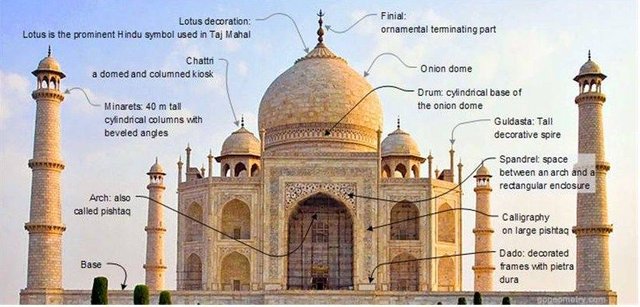
Taj Mahal is a piece of a detailed complex comprising of an enlivening entryway, a delightfully planned garden, an awesome water framework and a mosque. The complex is arranged on the southern banks of stream Yamuna. The complex extends in a south to north slope towards the stream and is built in steps.
Outside of the Taj Mahal :
The focal concentration of the complex is the Tomb structure. Made totally out of white marble, its excellence lies in the symmetry of its design. The structure is arranged on a raised square plinth, additionally made of white marble, at a tallness of 50 m from the stream level, toward one side of the complex. The tomb itself is arranged at the focal point of the plinth, confined by four equidistant minarets.

The Taj Mahal is a square structure with sides measuring 55 m. The minarets are spread at a separation of 41.75 m from the tomb divider and have a tallness of 39.62 m. There is a bulbous focal vault in the primary building, 18.28 m in breadth and 73 m in tallness. The arch is lifted from the highest point of the working by a 7 m high tube shaped base. It is enlivened at its best by lotus theme and finishes in a plated finial finished with the Islamic half-moon. The circular and fabulous part of the focal vault is stressed by joining of littler arches on the two sides as chhatris, additionally topped in overlaid finials. Every minaret is partitioned into three equivalent sections by two overhangs and has an octagonal base. The fragile bend of the vault is underscored by the decreasing structure and marginally rakish position of the minarets. The passageway to the primary tomb is confined by an enormous angled vault or Iwan which thus is again surrounded by two comparative however littler curves on each side. These curves demonstrate stacked galleries along two unique levels. This is called pishtaqs, which is recreated on all the eight edges of the building bearing it another measurement of symmetry.
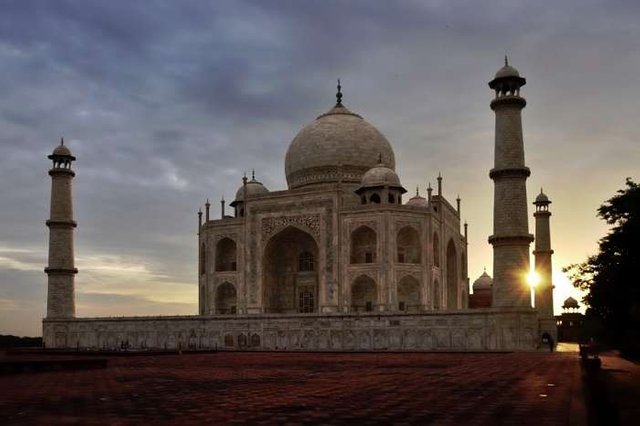
The juxtaposition of solids and voids in mix with curved and arched outline components make a stunning impact of complexity. The marble outside changes shading occasionally mirroring the light states of the day and produces a surprising silvery translucent impact around evening time.
The outsides of the Taj are trimmed with mind boggling adornments. Liberally trimmed with valuable gemstones like opals, lapis lazuli and jade, the enhancements offer staggering flashes of shading against a white foundation. Stucco and compositions cover the outside dividers alongside calligraphy of verses from Quran or extracts from ballads in dark marble. Paintings of herringbone decorates and marble jaalis, mosaics of hued stones in geometric examples alongside dynamic decorations cover the outside floors and surfaces.
Inside of the Taj Mahal :
The inside of Taj mahal is commanded by a huge octagonal focal chamber with eight littler chambers emanating from it. The littler chambers are leveled crosswise over two stories making an aggregate of 16 such specialties. The focal chamber is the fundamental funerary chamber lodging the cenotaphs of Mumtaz Mahal and Shah Jahan. The two elaborate marble cenotaphs are encased inside a marble screen and face the south. The real sarcophagi are housed underneath the tomb is a moderately straightforward grave.
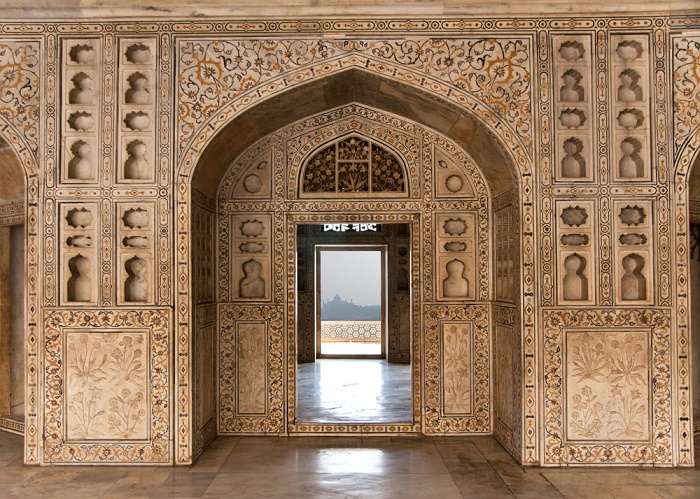
In spite of the fact that Islam precludes expand enhancement of tombs, Shah Jahan ostentatiously ignored the direct and authorized rich enumerating of the inside surfaces. Trims of Pietra dura and lapidary enhance the floors and works of the dividers and floors. Bounteous measures of gemstones were utilized for the plan alongside hued stones. Profoundly cleaned surfaces mirror the light separated through marble cross section work in the windows and curves. Calligraphic engravings of the 99 names of God is cut on the tombs itself and on Shah Jahan's tomb an expansion section has been recorded in faultless calligraphy understanding "He set out from this world to the meal corridor of Eternity the evening of the twenty-6th of the period of Rajab, in the year 1076 Hijri.".
The Garden (Mughal Garden) at the Taj Mahal :
The garden is an unpredictable piece of Mughal catacombs and is normally known as Charbagh. Raised red sandstone pathways partition the Mughal plant into four portions which are thusly fractioned into 16 symmetrical areas. A raised square marble pool is arranged halfway between the Taj Mahal and the Entrance.
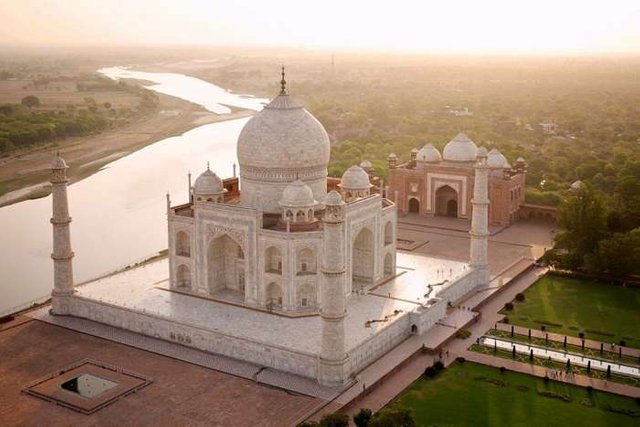
The Hawd al-Kawthar or Tank of Abundance situated on the north-south hub offer excellent impression of the Taj in all its grandness. Different natural product bearing trees and Cyprus trees symbolizing life and demise individually are masterminded in symmetrical equidistant examples along the raised focal pathway. The garden is outlined such that it offers unhindered perspective of the Taj from any arbitrary point.
Different Buildings in the Taj Complex :
Each component of the Taj complex was intended to maintain the superbness and magnificence of the Taj Mahal. The primary passageway entryway or Darwaza-e-Rauza is developed with red sandstone and is outlined such that remaining outside the opening one can't see the Taj, however after entering it shows offering a stunning impact.

The mosque on the western side of the Taj Mahal and the Nakkar Khana or visitor house on the eastern side are made with red sandstone. They are perfect representations of each other in plan, which in Mughal compositional terms is called Jawab, and improve the symmetry of the Taj alongside underscoring the translucent magnificence of the white marble structure.
Development of the Taj Mahal:
Development of the Taj Mahal began in the year 1632. Around 22,000 bricklayers, stonecutters, calligraphers and craftsmans, from all finished India and Central Asia were utilized amid the development time of 22 years. The marble utilized for the building was sourced from different parts of India and around 1000 components were utilized for this reason.
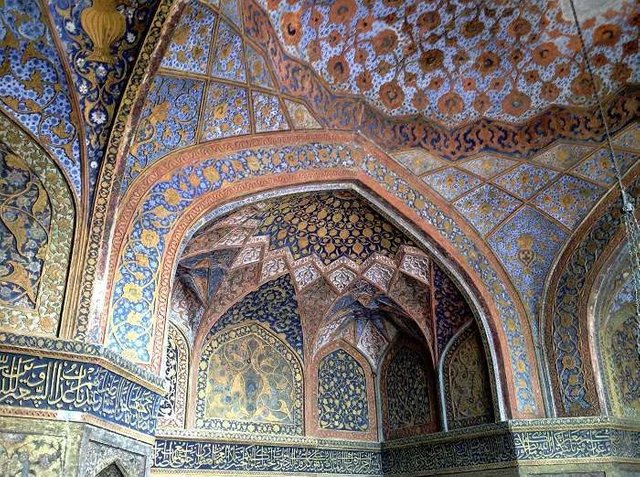
A leading group of engineers regulated the plan components under supreme supervision. The principle tomb took 10 years to fabricate and other subordinate structures took an additional 12 years to finish.
Taj Mahal - Myths and Legends :
A few myths encompass the Taj Mahal. The most across the board of them is that after culmination of development, Shah Jahan requested the thumbs of the draftsmen and laborers to be cut of with the goal that they can't recreate the work they improved the situation him. This however does not have any chronicled confirm.
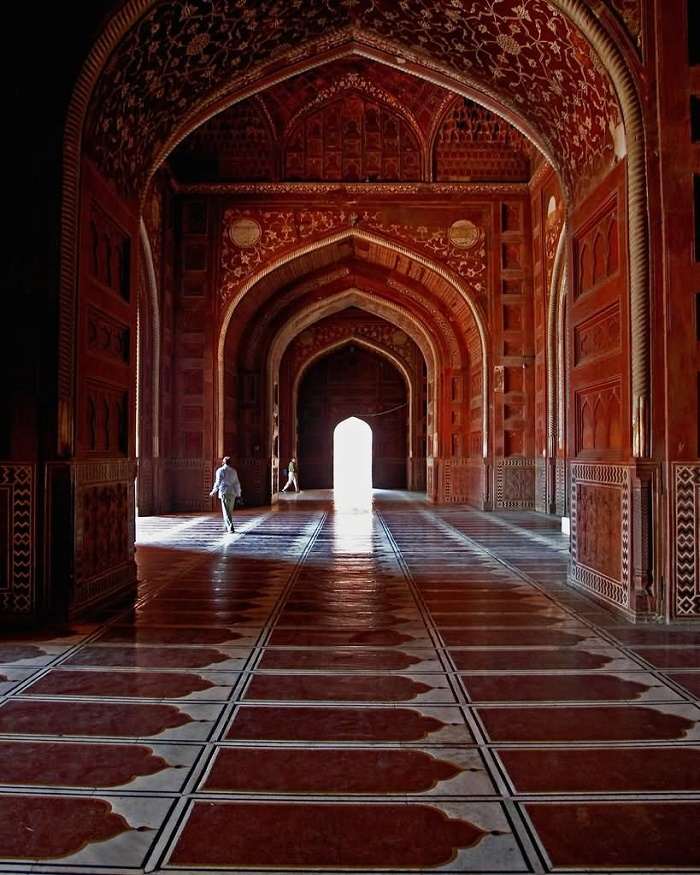
There is likewise the myth of Shah Jahan authorizing a Black Taj Mahal, however was not able complete it since his govern was ousted by his child Aurangzeb. A few students of history trust that the remnants uncovered in the Mehtab Bagh, arranged on the contrary bank of waterway Yamuna, are the deficient stays of the structure attributable to its closeness with Taj Mahal's symmetrical engineering.
An Indian essayist, P. N. Oak guaranteed that the Taj Mahal was based on the site of a Shiv Temple called Tejo Mahalaya that was initially worked by a Hindu lord Parmar Dev. In any case, this case was rejected by the Supreme Court of India regardless of petitions for unearthings.

Most recent eight years of Shah Jahan was spent in repression in the Shah Burj of the Agra Fort. It is said that he spent his days looking towards the Taj Mahal from a little jharokha in his phone and recollecting his adored Mumtaz Mahal.

fantastic!!!
Downvoting a post can decrease pending rewards and make it less visible. Common reasons:
Submit
thanks...
Downvoting a post can decrease pending rewards and make it less visible. Common reasons:
Submit
You've provided with such a great piece of information to the readers. This is really great. I didn't know such great information about the Taj Mahal. You can visit my page @vinaypsychic if you love reading inspirational stories.
Downvoting a post can decrease pending rewards and make it less visible. Common reasons:
Submit
Thanks...@vinaypsychic
Downvoting a post can decrease pending rewards and make it less visible. Common reasons:
Submit
Nice @deepak2001
Downvoting a post can decrease pending rewards and make it less visible. Common reasons:
Submit
thanks....@steemitglass
Downvoting a post can decrease pending rewards and make it less visible. Common reasons:
Submit
This post has received a 0.10 % upvote from @drotto thanks to: @banjo.
Downvoting a post can decrease pending rewards and make it less visible. Common reasons:
Submit
Thankss
Downvoting a post can decrease pending rewards and make it less visible. Common reasons:
Submit
This post has received a 4.55 % upvote from @kittybot thanks to: @deepak2001.
Downvoting a post can decrease pending rewards and make it less visible. Common reasons:
Submit
thankss
Downvoting a post can decrease pending rewards and make it less visible. Common reasons:
Submit